Earlier in June, we sat down for our third episode of the Canberra Community Convos podcast with our Out of School Hours Care (OSHC) Behaviour Support and Service Development Officer, Alister Abercrombie, and Shaniah Norman, the Second-in-Charge (2IC) at a Communities at Work’s OSHC service. Join us for a deep dive into all things OSHC in the podcast episode below:
Or, keep reading for highlights of essential topics discussed in the episode concerning Before and After School Care within and beyond Communities at Work’s OSHC services in Canberra!
What is Out of School Hours Care (OSHC)?
OSHC, or Out of School Hours Care, sometimes known as Outside School Hours Care, covers Before and/or After School Care programs for preschool and primary-school-aged children. At Communities at Work, we cater to children in preschool till Year 6 at our various OSHC services in schools across Canberra and the ACT region.
As Shaniah explains, the kind of activities that take place within these Before and After School Care programs are based on children’s interests. They are also guided by the OSHC staff’s observations of the children and collaborative discussions with families and the children.
OSHC activities typically cater to a range of skills that support children’s learning and development while providing a fun and engaging environment. This can include sports, art and craft, music, dance, drama, writing etc.
“Our learning frameworks set the goal for us to help children develop. So, we are no longer in a space where OSHC is viewed as a separate component where children just hang out after school. Our teams put in a huge amount of effort to carry out this educational program that caters to children’s needs, interests and skills,” says Alister.
What kind of activities form Before and After School Care?
Designing an Out of School Hours Care curriculum, particularly for After School Care programs, requires a delicate mix of distinguishing the ‘curriculum’ from the school so that the children are not learning the exact same things that they do in class while figuring out the children’s interests, their strengths and areas of improvements, to broadly achieve their developmental milestones.
The OSHC framework further encourages exploration of culture and community, what that means for children, and broadening their worldviews while learning about themselves. Each OSHC service is different, and almost every day within an OSHC service is different too. Activities can be spontaneous and planned, depending on the children and the educators in-service.
“For example, we have our building areas with Legos and building blocks, our craft activities, and our board games, and then the general setup of sports and everything outdoors. However, the children could request a cooking experience on any given day, and the educators would spring into action to make it happen,” explains Shaniah.
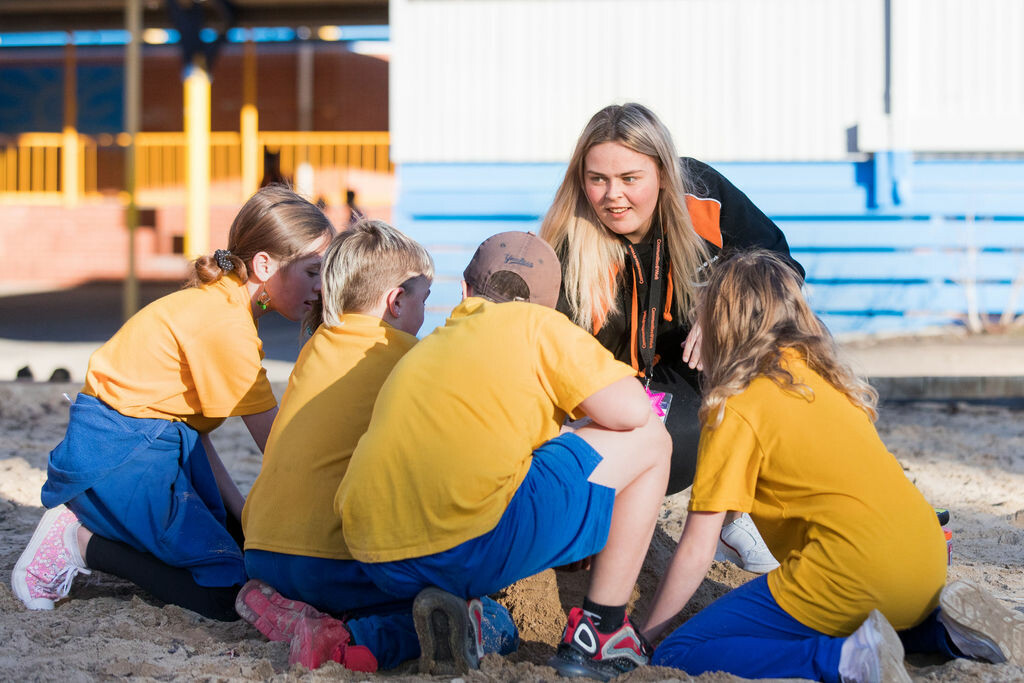
Play-Based Learning and Purpose
The purpose and role of OSHC in children’s learning and development, particularly the play-based activities, is to support the children to be more social and engaged. It could be helping children learn how to function as a group as well as on their own, improving both their collaborative and independent working skills.
Highlighting the importance of play-based learning, Alister says, “Gone are the times when you’d think about play as a child’s interaction with an object, like stacking blocks in a particular way, for example.
We have moved away from that towards a broader idea where play is an entire developmental domain for the child. Play is a space where the children get to explore and express – it is their primary mode of creativity. We look at interpersonal relations and development through play. We look at skill development and learning through play.
For example, if children are playing a cooking game during After School Care, you might have a goal to make cakes for customers. The children will then practice a bit of conflict resolution, where they will figure out how the shop will run with their peers. Some of the savvy children might even figure out a pricing schedule and how to make the business viable, and so on, in collaboration with the OSHC educators,” says Alister.
Children’s development ecosystem: Before and After School Care
Now that we have established that OSHC educators provide more than just care for children in the before and after-school care programs by supporting children’s learning, let’s dive into how OSHC addresses significant ‘social’ issues that children face.
“Let’s start by looking at social issues affecting children – a big one these days is ‘sustainability’. With the current environmental changes and the uproar around this issue, there is a bit of climate anxiety among children. You might have seen a few news headlines about children starting to engage in protests, for instance, trying to provide policy direction for the government, which is justified because we’re talking about their future here.
“So, at a service level, it is up to us to figure out what the OSHC service’s policy is on sustainability, what do we do, and how do we work together on that end to enable children to contribute to those ideas – such as creating a sustainability action plan, outlining goals for recycling, coming up with wonderful activities from waste materials etc.,” explains Alister.
“Yes, for example, at one of our OSHC services, we frequently do activities where we get the children together, go around the school, and pick up all the rubbish. And we have done sustainability projects like using recycled materials to build the children’s vision of their future together, which they absolutely enjoyed. Plus, it was meaningful to them,” Shaniah elaborates.
Climate, Environment and Sustainability are among the many issues affecting children today. Hence, in our Before and After School programs, it is crucial to go beyond a leisure-based setting. The aim is to fill the gaps that the “jam-packed” Australian curriculum may not necessarily have room for in the usual classroom setting.
That being said, the key to a great OSHC program comes down to being child-led. It operates in a leisure-based space with a lot of excellent planning and programming. It also enables the breeding of creativity, giving children the time to think, reflect and develop ideas that help their growth as individuals.
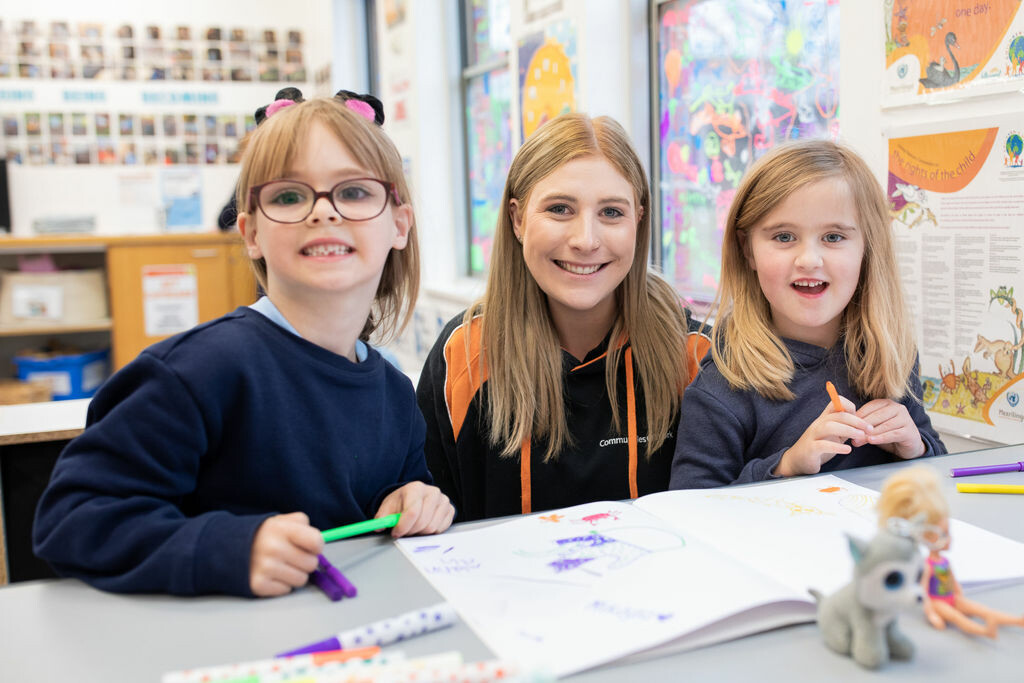
Behaviour Management and Support for Additional Needs in OSHC
There are children in service that are completely happy doing their own thing and making friends and whatnot, but then there are children that need a little bit of that extra support.
“I think we are best suited to deliver good outcomes for children right now, as behaviour support needs are on the rise, with mental health issues among children increasing, which has turned not just the OSHC sector, but the entire education and care sector towards really focusing on behaviour management and inclusion support and so on,” says Alister.
Out of School Hours Care programs operate on what you’d loosely call a positive behaviour support framework, one of the fundamental principles of which is acknowledging that behaviour is a form of communication. It can communicate personal stress, a child’s capacity to cope in an area or reflect on what their relationships are looking like.
“At the end of the day, a child’s behaviour is influenced by personal aspects like thoughts and feelings, but also by their environment, routines, the people around them, and their responses to it all. So, the responsibility of OSHC educators becomes to wade through all of that and figure out how best to support them. The main goal is understanding that behaviours aren’t necessarily ‘bad’ or ‘negative’ – it is not about punishing the behaviours out of them but viewing behaviour as a form of expression and navigating it according to context,” explains Alister.
Communities at Work’s Out of School Hours Care leadership team uses a mix of formal training opportunities and informal mentoring activities to enable our OSHC educators to be equipped with managing behaviour and providing additional support to children as needed.
“For example, in the training, you might learn that behaviour happens on a bit of a continuum and how to respond in kind. It all comes back to the values and the positive relationships you want to build with children,” says Alister.
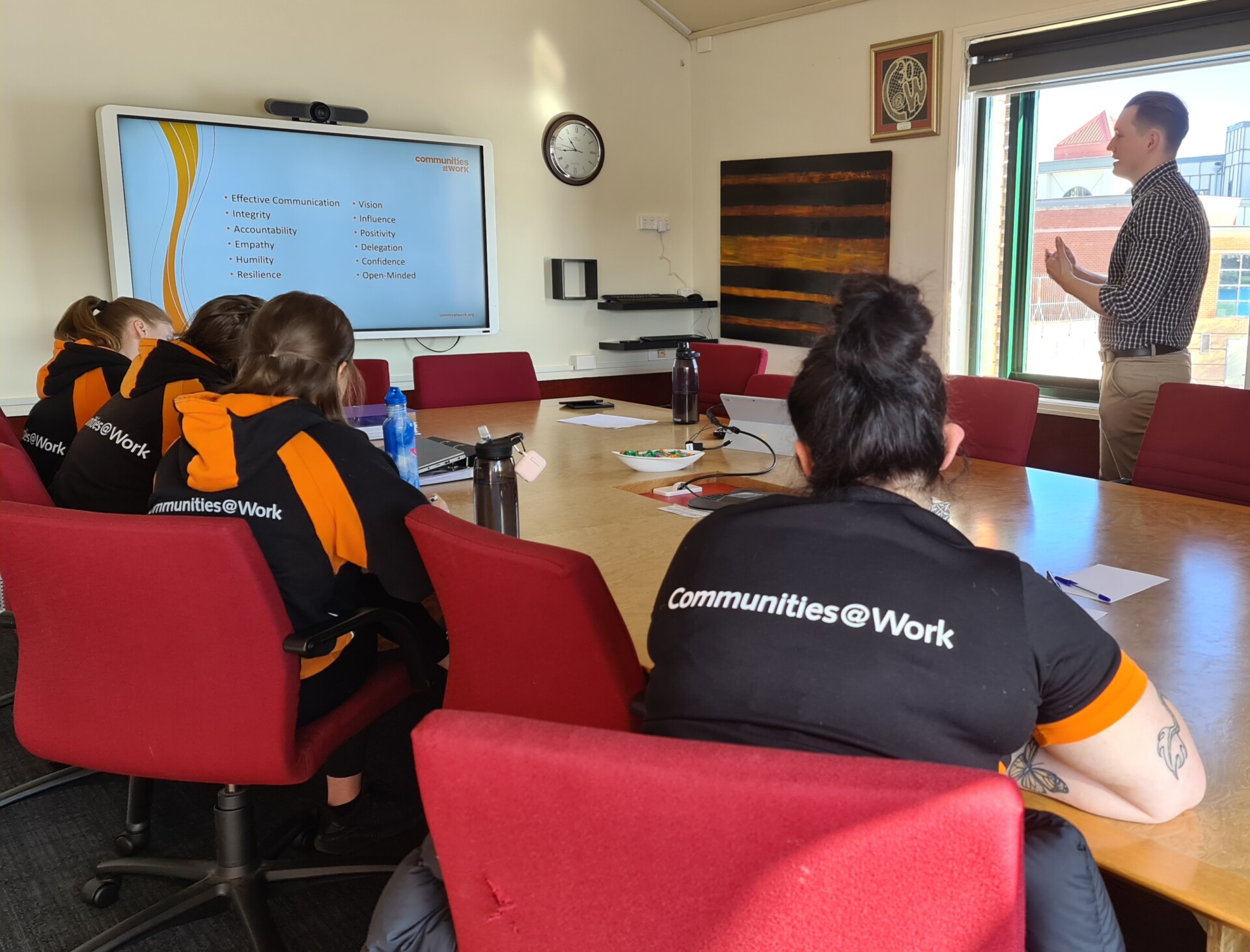
Supporting Our Staff to Support Children in OSHC programs
Additionally, on-site (at service) mentoring and coaching by OSHC program coordinators to the educators ensures that both children and staff always feel supported.
“Yeah, as soon as the educators come in, we talk about the behavioural plans that we have got in place. We observe how the educators interact with the children, especially those that require more attention, and observe how the children are interacting and responding. There is an element of modelling behaviours and helping the educators on the floor navigate that too,” adds Shaniah.
“What makes a difference is also then having those discussions with the educators around what worked and what didn’t during meetings and just even at the end of the day when they step off the floor, and to connect back to this idea of ‘you’ve just supported a child in having a better day – you’ve helped them regulate themselves in this space’ and just positively engaging with the educators,” explains Shaniah.
“It’s also important to keep in mind that behaviour management and additional support is not one of those things that can be put in a framework entirely. The framework is more of a guide because every child is completely different, and what might work for one child may not work for someone else,” says Shaniah.
Our OSHC teams hence focus on training educators for targeted behaviour support and adopting an adaptive style that is guided by the children and their understanding of the worldview. There are no universal approaches, and our Behaviour Support and Inclusion Team particularly undertake that analysis and develops strategies that can support the specific children that require that support.
“I really do like the full-circle nature of it all. The children are watching adults and ‘modelling’ their behaviour, and then younger educators are watching the more senior educators learn what they do, and the senior educators are watching the children to figure out what’s best for them. It’s a lot of everyone watching and supporting each other and this beautiful ecosystem has been created.”
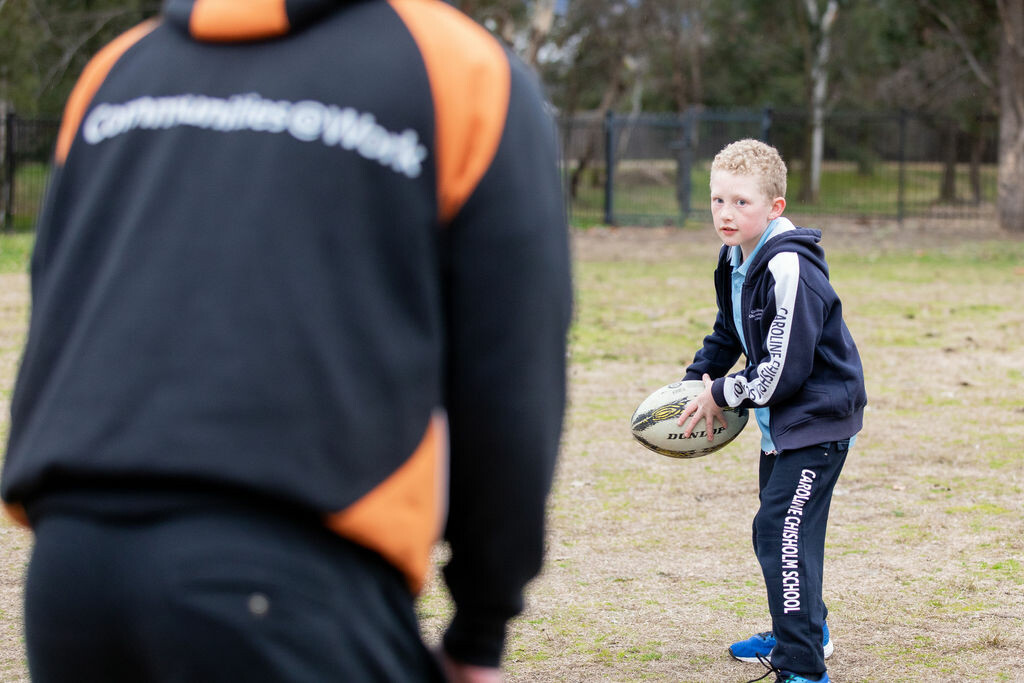
Positive relationships with the school and families
A holistic approach becomes extremely important to address issues facing children, particularly those who may be struggling to positively engage at school and/or in Out of School Hours Care, and/or at home. This is where wrap-around support becomes crucial, working with the child’s family and the school, ensuring that we have identified any ‘problems’ correctly and working collaboratively towards a ‘solution’.
“If we come up with strategies to support the children’s needs, it’s better for them and easier for us if there’s a continuity of those strategies in the school and at home. It’s also better for the young person and for the families knowing that support is there for the child, so another thing we do in OSHC is to try and link them with the right people, whether that’s at school or in the community,” says Alister.
We believe it is constructive and vital to have that relationship with not just the children but also the families to be able to connect those links, to have that positive communication, and that ongoing engagement with the schools, to ensure that children can learn, grow, succeed, and overcome any issues that they may be facing. Furthermore, our Before and After School Care educators also play a significant role in showing the children and families that there are positive people providing a stable force in the children’s lives, especially those who may require that additional support.
Another example of how we address issues facing children, and ensuring positive relationship building and positive engagement with the children’s ecosystem is around multiculturalism, inclusion and diversity.
“In the OSHC leadership team, we are aware that culture clash could be a potentially tricky issue, and the way to get around that is by exploring culture and just being familiar with. For instance, with teams like Shaniah’s, they may do a bit of a survey and figure out what’s the background culture of all the families in the service, and the way to explore that most authentically is for the families and children to tell us what is meaningful to them, telling them they’re the expert and collaborating with them on how we can integrate some of that into our OSHC service,” explains Alister.
“It’s almost like a melting pot of experiences, because we have the broad leisure-based framework, and then the exploring of these different aspects of what matters to the families and the children and even the schools on a service-level with positive relationship building,” finishes Shaniah.
Before and After School Care Programs: An Asset to Families and Schools
At the end of the day, children spend a significant amount of time in Before and After School Care. The activities they engage in and the experiences they share during those times shape their learning and development as members of the community.
OSHC acts as an essential driver for the interaction between the children and the broader community. For instance, Communities at Work’s Before and After School Care teams are involved in the ‘school culture’ – a small example is how our OSHC Program Coordinators like to be present for the school assemblies, graduations, and other such events.
On a service level, OSHC teams are really involved with the schools – they are connected to principals, engage in frequent meetings with the schools, and ensure that the OSHC service is aligned to the goals of that school and what they’re hoping for to achieve for their students.
“For example, a principal might talk about a fundraiser that the school is participating in, and we’ll have OSHC sites that will become involved with it too, such as the Red Nose Fundraiser and Camp Australia etc. What’s even more amazing is that children drive these events, and our educators simply facilitate that authentic interaction with the community.”
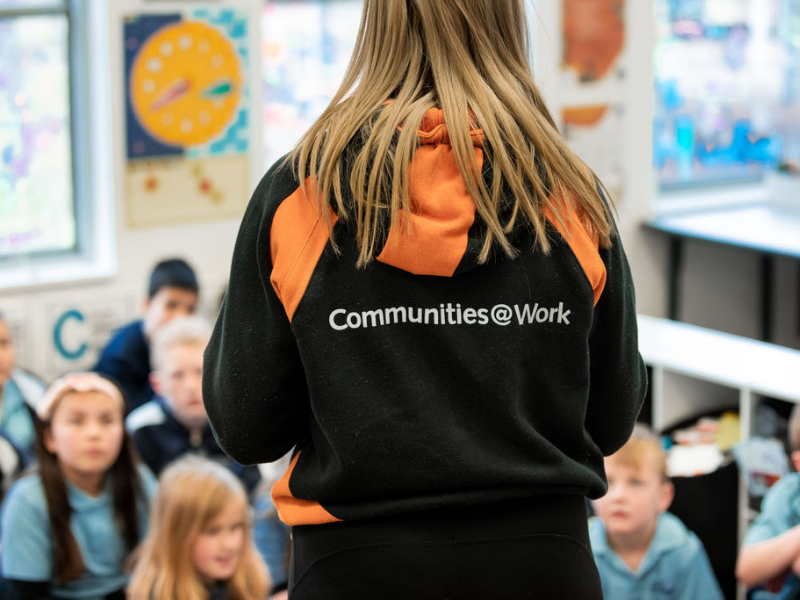
Listen to the full podcast episode below (including a BONUS segment about Careers in Out of School Hours Care) on Communities at Work’s Youtube Channel.
Find out more about Communities at Work’s OSHC Before and After School Care programs and locations on our OSHC Services page.
Considering a career in providing high-quality education and care to children? Or even looking for a flexible and casual role that helps you grow and contributes to children’s learning and development? Apply now for a position with our Out of School Hours Care services on our Careers page.
You can also contact our Recruitment team with your resume if you have a qualification and/or experience in Children’s Services and don’t see an open job opportunity. We’re always on the lookout for passionate educators and education professionals to join our teams: recruitment@commsatwork.org
